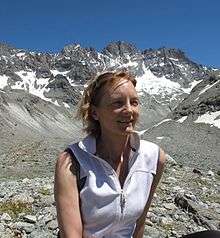Jemma Wadham
Jemma L Wadham is a British glacial biogeochemist.
Jemma Wadham | |
|---|---|
 Jemma Wadham at the Arolla Glacier | |
| Nationality | Britain |
| Alma mater | MA University of Cambridge PhD University of Bristol |
| Awards | Philip Leverhulme Prize (2007) |
| Scientific career | |
| Fields | Glaciology |
| Institutions | University of Bristol |
| Website | Wadham at the University of Bristol |
Early life and education
Wadham completed her BA and MA in physical geography at Cambridge University. She then completed her PhD at the University of Bristol in 1998.
Career
Wadham undertook a short post-doctoral research post at the University of Leeds before returning to the University of Bristol to take up a post at the Bristol Glaciology Centre.[1][2]
Wadham researches glacial ecosystems and investigates their impact on biogeochemical processes.[3][4][5] She has worked in the polar regions, including the Antarctic[6] and the Greenland ice sheets.[7] This has led to more than 90 articles[8] and a textbook on Antarctic lakes.[9]
She has been involved with the International Scientific Committee on Antarctic Research, the Scientific Committee on Antarctic Research (SCAR) and subglacial science in Antarctica.[10] She has served on the Lake Ellsworth Exploration Steering Committee and is a contributor to this subglacial lake exploration programme.[11]
In 2012, Wadham's team at the University of Bristol used computer models to predict the amount of trapped methane under ice sheets and discovered 400 billion metric tons of carbon beneath.[12][13]
She is one of few women working on technology development for exploring subglacial lakes.[7] Her work in Greenland has advanced our understanding of the dynamics of ice sheets and their contribution to global biogeochemical cycles.[7][5]
Awards and honours
She was awarded a Philip Leverhulme Prize in October 2007 for her international contribution to polar science.[14]
References
- Bristol, University of. "Professor Jemma Wadham – School of Geographical Sciences". bris.ac.uk. Retrieved 31 May 2016.
- "Bristol Glaciology Centre". bris.ac.uk. Retrieved 31 May 2016.
- "Billions of Tons of Methane Lurk Beneath Antarctic Ice | Climate Change". Live Science. Retrieved 31 May 2016.
- Morales, Alex. "Antarctica's Hidden Carbon Stores Pose Warming Risk in Study". Bloomberg L.P. Retrieved 31 May 2016.
- "Jemma Wadham". speakezee.org. Retrieved 31 May 2016.
- "Billions of Tons of Methane Lurk Beneath Antarctic Ice | Climate Change". Live Science. Retrieved 31 May 2016.
- "'Cryo-egg' to predict sea levels". BBC. 11 December 2009. Retrieved 31 May 2016.
- Bristol, University of. "Professor Jemma Wadham – School of Geographical Sciences publications". bris.ac.uk. Retrieved 31 May 2016.
- "Antarctic Lakes". global.oup.com. Retrieved 31 May 2016.
- "Newsletter" (PDF). scar.org. SCAR. 2013.
- "Consortium members". ellsworth.org.uk. Retrieved 31 May 2016.
- Morales, Alex. "Antarctica's Hidden Carbon Stores Pose Warming Risk in Study". Bloomberg L.P. Retrieved 31 May 2016.
- "Billions of Tons of Methane Lurk Beneath Antarctic Ice | Climate Change". Live Science. Retrieved 31 May 2016.
- "Philip Leverhulme Prize" (PDF).